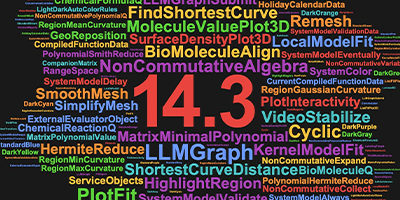Making the Most of Mathematica at Maker Faire
During the last weekend of May, I was one of the representatives for Wolfram Research at Maker Faire at the San Mateo County Expo Center in San Mateo, California. Maker Faire is the largest do-it-yourself (DIY) festival, organized annually by Make Magazine. Participants come from a wide variety of groups involved in projects related to arts, crafts, music, sculpting, robotics, engineering, and so on. The participants are aptly named makers, and their creations are showcased in this two-day family-friendly event. While I don’t have the exact figures, the number of people at this faire was around 78,000.

This is the first time Wolfram Research has participated in the faire, and our presence was pleasantly accompanied by the launch of Wolfram|Alpha and its
recent spotlighting on NPR’s Talk of the Nation. The visitors to our booth who tried queries on the site had highly positive remarks as well as requests for more coverage on such topics as sport statistics and philosophical questions. People who hadn’t had the chance to try Wolfram|Alpha did so at our booth and were quite stunned at the idea of such an application. We had quite the discussion with the crowd at this faire about the technologies that made it possible (ahem, Mathematica!) and why it is not just a search engine.
While we received interest from people who already knew about Mathematica, about half of our visitors were hearing about it for the first time. The name alone attracted quite a few students and parents wanting to know whether this is a mathematics education tool. They walked away with high hopes after viewing the Wolfram Demonstrations Project. It was my pleasure to convert a father’s remark to his 8-year-old, “[Mathematica] is too complex for you… maybe in a few years you’ll be ready for it,” into “Wow, that’s something she could work with right now!”

The crowd already familiar with Mathematica varied from active fans to those who haven’t seen the changes in the past few years to those who were waiting for a home edition (which we now have). Quite a few visitors that stopped by our booth were happy to see that they could afford to buy Mathematica Home Edition to support their hobbies. Also, presenting the new interactive features introduced in Version 6 and the image processing capabilities of Version 7 is always a blast when a crowd is not expecting it.
One other area that became a hit with this crowd was visualization and graphics design. The videos featured in an earlier blog post definitely caught a few eyes in the crowd, particularly the “Around the World with Mathematica” video. People were captivated by the animation itself and enjoyed hearing how the different pieces such as the spherical view of the map, country borders, capital cities, and path traveled were all accessed and computed within Mathematica.
Equipped with a black-and-white printer and iron-on papers, I downloaded the graphics from Chris Carlson’s blog post titled “Hybrid Logos and a Fortunate Mistake” and distributed them. I even set up a station with the Manipulate code from that blog so people could design their own patterns. Quite a few children were up to the challenge—resulting in real competitions between siblings.

It was quite an educational experience for us to attend the Maker Faire this year. We could easily have a larger presence if we could gather Mathematica users who make things… “Mathematica makers“. There could be mini workshops where one could spend a few minutes on a computer tweaking some parameters for a desired result and then relaying said parameters to real life. For example, a simple paint-mixer application that lets you calculate the amount of different color paints to combine to achieve another color, with the collection of the original colors available to mix yourself. Or a ballistic trajectile application that lets you calculate the angle and velocity to throw different objects to a preset target, and then letting you actually do it. These types of interactive sessions would help demonstrate the power to make things with Mathematica. What would you make with Mathematica? Are you working on a cool project with Mathematica right now? We want to hear about it.



